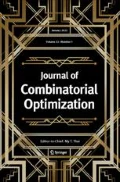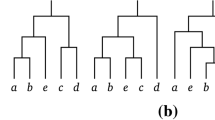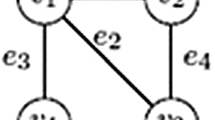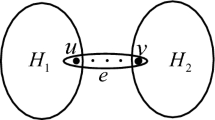Abstract
The comparison of tree structured data is widespread since trees can be used to represent wide varieties of data, such as XML data, evolutionary histories, or carbohydrate structures. Two graph-theoretical problems used in the comparison of such data are the problems of finding the maximum common subtree (MCT) and the minimum common supertree (MCST) of two trees. These problems generalize to the problem of finding the MCT and MCST of multiple trees (Multi-MCT and Multi-MCST, respectively). In this paper, we prove parameterized complexity hardness results for the different parameterized versions of the Multi-MCT and Multi-MCST problem under isomorphic embeddings.
Similar content being viewed by others
References
Akutsu T (1992) An RNC algorithm for finding a largest common subtree of two trees. IEICE Trans Inf Syst 75(1):95–101
Akutsu T, Halldórsson M (2000) On the approximation of largest common subtrees and largest common point sets. Theor Comput Sci 233(1–2):33–50
Aoki KF, Yamaguchi A, Okuno Y, Akutsu T, Ueda N, Kanehisa M, Mamitsuka H (2003) Efficient tree-matching methods for accurate carbohydrate database queries. Genome Inf 14:134–143
Bodlaender H, Downey R, Fellows M, Hallett M, Wareham H (1995b) Parameterized complexity analysis in computational biology. Comput Appl Biosci 11(1):49–57
Bodlaender HL, Downey RG, Fellows MR, Wareham HT (1995a) The parameterized complexity of sequence alignment and consensus. Theor Comput Sci 147(1–2):31–54
Downey RG, Fellows MR (1999) Parameterized complexity. Springer, New York
Farach M, Thorup M (1994) Fast comparison of evolutionary trees. In: The fifth annual ACM-SIAM symposium on discrete algorithms. Society for Industrial and Applied Mathematics, Arlington, pp 481–488
Fellows MR, Hallett MT, Stege U (2003) Analogs and duals of the MAST problem for sequences and trees. J Algorithms 49(1):192–216
Gou G, Chirkova R (2007) Efficiently querying large XML data repositories: a survey. IEEE Trans Knowl Data Eng 19(10):1381–1403
Gupta A, Nishimura N (1998) Finding largest subtrees and smallest supertrees. Algorithmica 21(2):183–210
Hallett MT (1996) An integrated complexity analysis of problems from computational biology. PhD thesis, University of Victoria
Rosselló F, Valiente G (2006) An algebraic view of the relation between largest common subtrees and smallest common supertrees. Theor Comput Sci 362(1–3):33–53
Zaki MJ (2002) Efficiently mining frequent trees in a forest. In: The eighth ACM SIGKDD international conference on knowledge discovery and data mining. ACM, Edmonton, pp 71–80
Author information
Authors and Affiliations
Corresponding author
Rights and permissions
About this article
Cite this article
Chen, W., Schmidt, M.C. & Samatova, N.F. On the parameterized complexity of the Multi-MCT and Multi-MCST problems. J Comb Optim 21, 151–158 (2011). https://doi.org/10.1007/s10878-009-9220-2
Published:
Issue Date:
DOI: https://doi.org/10.1007/s10878-009-9220-2




